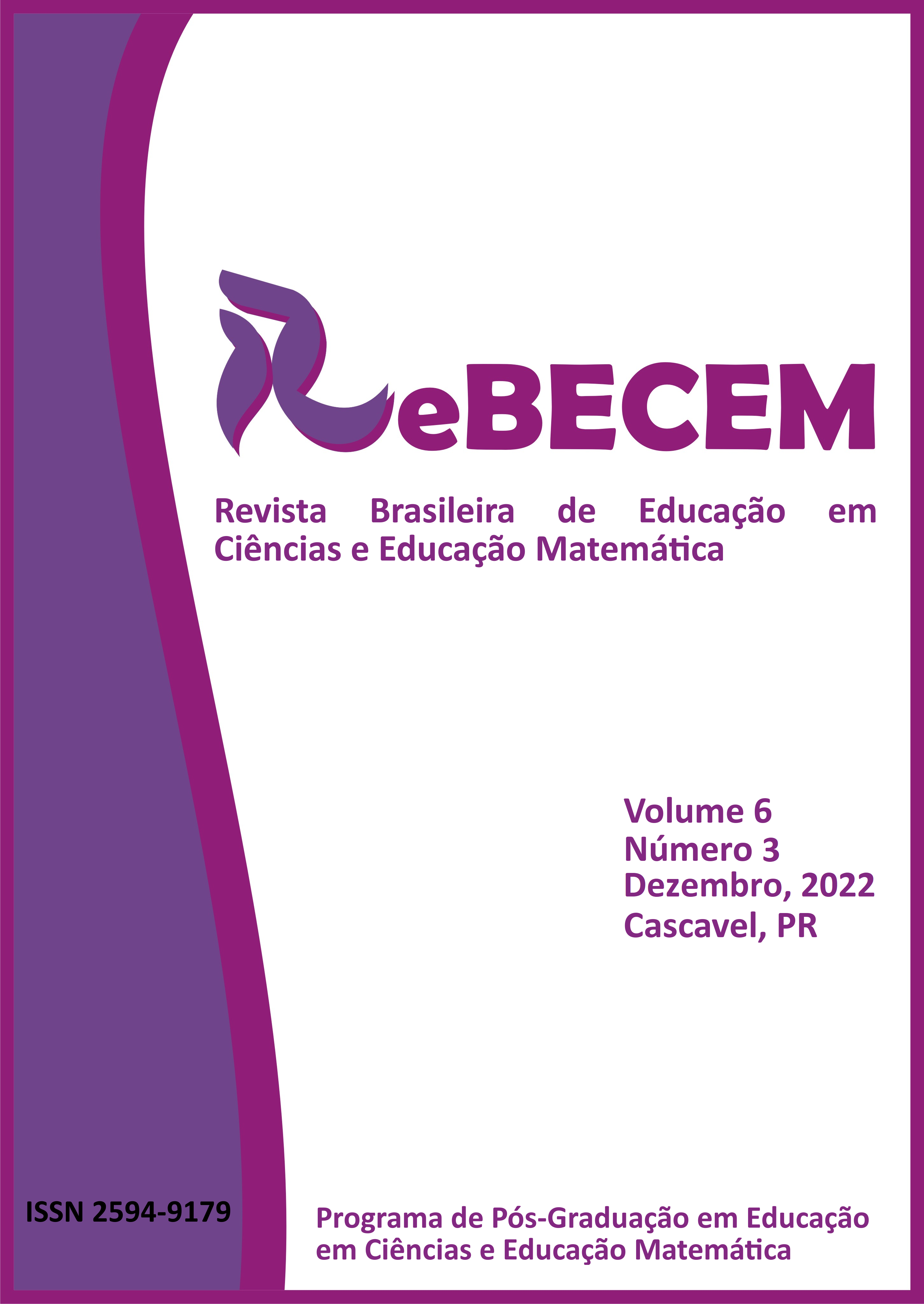Learning the notion of comparison between integers numbers:
a study based on Thorndike connectionist theory
DOI:
https://doi.org/10.48075/ReBECEM.2.v.6.n.3.28715Keywords:
Integer numbers, Trial and Error, Connectionism, LearningAbstract
Considering the influence of the multiple response law proposed by Thorndike (1913) and the use of games as a didactic resource for mathematical learning, this article aims to verify the trials and errors presented by students during the application of a game involving the notion comparison between integers numbers. for this, the game called siri ride was applied, with students from a 6th grade class of elementary school final years, which provided a favorable environment for the execution of successive attempts by the students, until they reach the solution of the proposed situation. This type of activity has the potential to promote reflection, survey and test of hypotheses, in addition to contact with error, for the construction and/or consolidation of mathematical knowledge, also allowing the teacher to draw an overview of the understanding of the students about the notion that has been worked on.
Downloads
References
BIZERRA, A.; URSI, S. Teorias da aprendizagem: influências da psicologia experimental. Introdução aos estudos da educação I. São Paulo: USP/Univesp/Edusp, 2014.
GIL, A. C. Métodos e técnicas de pesquisa social. 6. ed. São Paulo: Atlas, 2008.
GONÇALVES, A. L. A professora, a criança e o trabalho pedagógico. In: CONGRESSO ESTADUAL PAULISTA SOBRE FORMAÇÃO DE EDUCADORES (IX), 2007, Águas de Lindóia. Formação de professores para a educação básica. Águas de Lindóia: UNESP, p. 57-64.
GRANDO, R. C. O jogo e a matemática no contexto da sala de aula. São Paulo: Paulus, 2004.
LARA, I. C. M. O jogo como estratégia de ensino de 5ª a 8ª série. In: ENCONTRO NACIONAL DE EDUCAÇÃO MATEMÁTICA (VIII), 2004, Recife. Anais do VIII ENEM - Minicurso. Recife: Universidade Federal de Pernambuco, 01-10.
LEFRANÇOIS, G. R. Teorias da aprendizagem. Tradução: Vera Magyar. 5. ed. São Paulo: Cengage Learning, 2008.
MOREIRA, M. A. Teorias de Aprendizagem. São Paulo: EPU, 1999.
ROCHA NETO, F. T. Dificuldades na aprendizagem operatória de números inteiros no ensino fundamental. 2010. 81 f. Dissertação (Mestrado Profissional no Ensino de Ciências e Matemática) – Universidade Federal do Ceará, Fortaleza, 2010.
SANTOS, C. G. D. O. Erro... Penso... Logo... Aprendo... Matemática. 2015. 93p. Monografia (Licenciatura em Pedagogia) – Faculdade de Educação da Universidade de Brasília, Brasília, 2015.
SMOLE, K. S.; DINIZ, M. I.; MILANI, E. Jogos de matemática e 6º a 9º ano. Porto Alegre: Artmed, 2007.
TOZONI-REIS, M. F. C. Metodologia da Pesquisa. 2. ed. Curitiba: IESDE Brasil S. A., 2009.
Downloads
Published
How to Cite
Issue
Section
License
Copyright (c) 2022 Joalisson Bahia Santana, Laerte Silva da Fonseca, Adriana Breda

This work is licensed under a Creative Commons Attribution-NonCommercial-ShareAlike 4.0 International License.
Autores que publicam nesta revista concordam com os seguintes termos:
1. Autores mantém os direitos autorais e concedem à revista o direito de primeira publicação, com o trabalho simultaneamente licenciado sob a Licença Creative Commons Attribution que permite o compartilhamento do trabalho com reconhecimento da autoria e publicação inicial nesta revista.2. Autores têm autorização para assumir contratos adicionais separadamente, para distribuição não-exclusiva da versão do trabalho publicada nesta revista (ex.: publicar em repositório institucional ou como capítulo de livro), com reconhecimento de autoria e publicação inicial nesta revista.
3. Autores têm permissão e são estimulados a publicar e distribuir seu trabalho online (ex.: em repositórios institucionais ou na sua página pessoal) a qualquer ponto antes ou durante o processo editorial, já que isso pode gerar alterações produtivas, bem como aumentar o impacto e a citação do trabalho publicado (Veja O Efeito do Acesso Livre).
Licença Creative Commons
Esta obra está licenciada com uma Licença Creative Commons Atribuição-NãoComercial-CompartilhaIgual 4.0 Internacional, o que permite compartilhar, copiar, distribuir, exibir, reproduzir, a totalidade ou partes desde que não tenha objetivo comercial e sejam citados os autores e a fonte.













